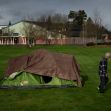The city of Portland, Oregon, has agreed to settle a class-action lawsuit that was brought forward last year by a group of individuals including some homeless residents of the city. The lawsuit was brought in May 2021 and accused the city of illegally throwing away people's personal belongings following citywide sweeps of homeless encampments.
The citywide sweeps dispersed the homeless encampments that developed throughout Portland. As a result of the sweeps, contractors who were brought in by the city would collect belongings found in the homeless campsites and illegally discard them.
The lawsuit alleges that the personal belongings should have been collected, tagged, and stored in a manner that would allow the owners of those belongings to retrieve them later. The lawsuit details that city law requires the collected property to be stored in a warehouse so that the homeless individuals can retrieve their belongings within the required 30-day time frame.
One plaintiff named in the suit, Jennifer Bryant, shared that during the sweeps, everyone's belongings were thrown into a truck without being labeled or categorized and with no intention of being stored. During her time on the streets, Bryant detailed that she lost possessions including a laptop, a sleeping bag, bedding, her clothes, and her tent due to the actions of the city.
Nearly one year after the lawsuit was first filed, the city reached a settlement with the plaintiffs. As a result of the settlement, Portland will implement a new set of rules when cleaning up and dispersing homeless encampments in the area. The new guidelines include the following rules:
- Prioritizing removal of “high-impact” campsites.” These are campsites defined as ones set up near schools, child care facilities, parks, and locations that are near flood and wildlife hazards.
- De-prioritize the removal of campsites in “low-impact” areas.
- The city will now provide 72 hours' notice to the homeless residents regarding when a campsite is going to be dispersed. The notice will share specific details about how the area will be cleaned up and where any removed property can be picked up by the owners.
- On the day of dispersion or cleanup, the city will give homeless residents at least an hour to collect and remove their personal belongings.
- The city has agreed that with any collected belongings, the items will be stored for no more than 30 days. Other items, including prescription drugs that are in properly labeled bottles and have not met their expiration date, identification, money, and credit cards can be stored for up to a year.
- Items that are unsanitary or have no utility or value will be discarded.
City officials shared in a statement that they were satisfied with the newly released guidelines. The statement explained, “The City was pleased to update its policies on handling personal property as part of the City’s ongoing campsite cleanup and removal program. The amended policy incorporates some suggestions that will provide more transparency, clarity, and predictability to all involved. Some changes will help City staff perform their work more effectively.”
Attorney Franz Bruggermeier with the Oregon Justice Resource Center, the group which helped file the lawsuit, also welcomed the settlement but highlighted the damage such sweeps cause the homeless population. Bruggermeier shared, “This does not mean an end to sweeps or the constant trauma and harms that come with those removals ... But we hope it will provide clarity to those living outside in public to better be able to reduce some of the harms of being removed from the places they are living.”
There has been a rise in homelessness throughout the nation with the West Coast seeing a steady uptick of homeless residents. Homelessness rates were already high in 2019 and throughout Portland’s metro area there was an estimated 4,500 - 6,000 individuals living without shelter. However, advocates for the homeless population say that this number has likely grown because of the pandemic.
Like many other cities with dense homeless populations, Portland has implemented stricter rules and guidelines on where encampments can pop up. There have also been more intentional discussions about housing alternatives for those who do not have shelter.
A major aspect of the homelessness crisis has been emphasizing methods that would not criminalize a population that is already at its most vulnerable. Advocates of the homeless population along with homeless individuals themselves see this settlement as a step forward in solving the crisis instead of criminalizing those who are suffering already.






